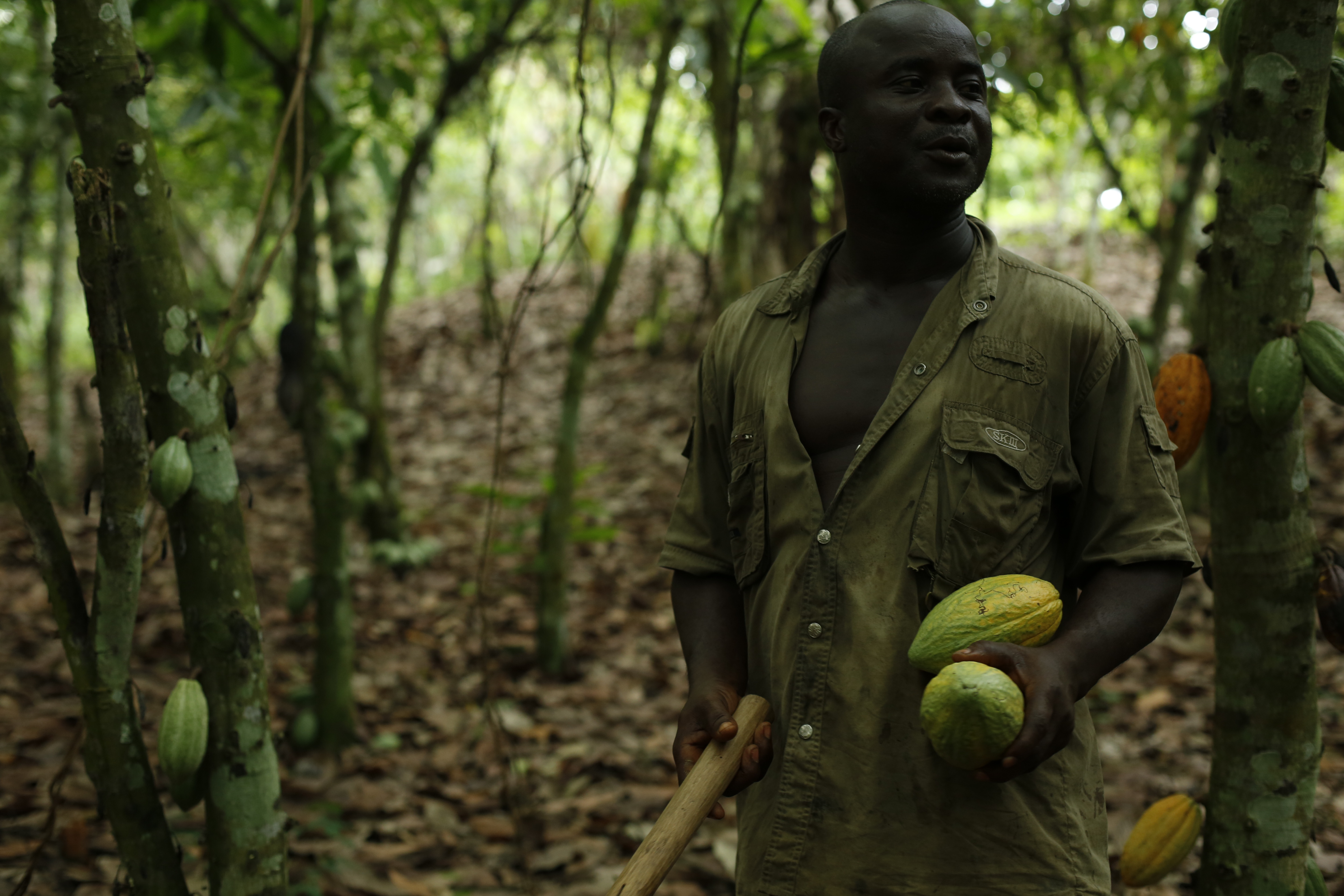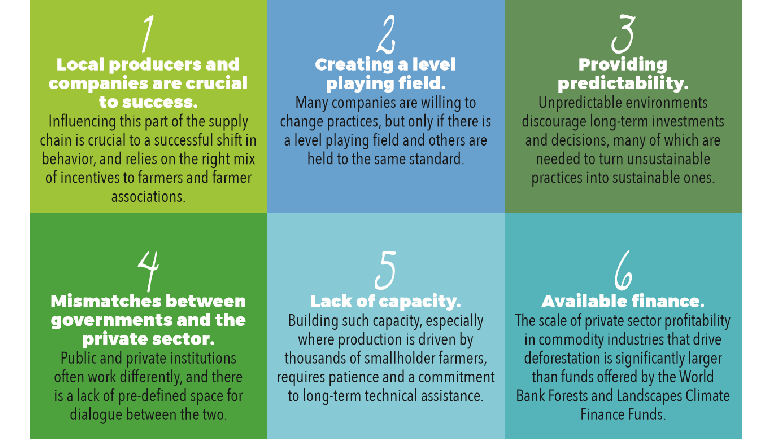“For many companies, forestry is not seen as an investment. It’s not scalable, not big enough… so I think part of the solution is how can we bundle forestry into larger investment opportunities to attract the big investors of the world,” says Margaret-Ann Splawn, Executive Director of UK-based Climate Markets & Investment Association, and private sector observer to the FCPF’s Carbon Fund.
What’s working
Despite the challenges, a number of opportunities for partnering with the private sector are emerging in relation to coffee, cocoa and cotton supply chains (see table below on country examples). International consumer companies, as well as global traders and producers, are coming under pressure to improve their sustainability. They also increasingly recognize that guaranteed supply depends on improving productivity, which in many countries is low or declining due to poor environmental stewardship or aging plantations.
The World Bank Forests and Landscapes Climate Finance Funds are using such opportunities to engage the private sector through different entry points:
- ENGAGE private sector actors early in the design process of REDD+ Programs.
- ENGAGE directly with companies that have made recent "zero deforestation" pledges.
- BUILD in existing, ongoing work by companies and NGOs in emission reductions program.
“The private sector seems to be in a very different place these days than it was just five years ago,” observes Morten Nordskag, Policy Director of Forest Investment and Multilateral Cooperation in Norway’s Ministry of Climate and Environment, and donor country participant in FCPF’s Readiness and Carbon Funds.
He adds, “I think it’s massively impressive the number of companies that have come forward to support the protection of tropical forests through the New York Declaration on Forests, and their keen interest in actually doing something in their supply chains. And I think, through the World Bank forest programs, supporting countries to advance implementation of their REDD+ agenda, there is an opportunity not to be missed for the private sector to achieve better products produced in a sustainable way that doesn’t result in the reduction of forest cover.”
Country examples of private sector engagement supported by the World Bank Forests and Landscapes Climate Finance Funds ETHIOPIA: Coffee Ethiopia and its partners are supporting the development of a climate-neutral coffee value chain as part of the Oromia Forested Landscape Program. The ISFL has partnered with the World Bank’s International Finance Cooperation, TechnoServ and Nespresso to help coffee farmers in Oromia adopt improved management and agronomic techniques, which will contribute to reduced carbon emissions. The project will reach 40,000 coffee farmers and 200 wet mills. GHANA: Cocoa The government’s Forestry Commission and National Cocoa Board are in partnership, exploring opportunities with companies, including OLAM, Mondelēz, and Touton, to jointly promote climate-smart cocoa practices, agroforestry, and community-based approaches to increase cocoa productivity and meet evolving global industry demand for sustainable cocoa supply chains. The FCPF-supported program is leveraging the Ghana Cocoa Platform (led by the Cocoa Board) and the Climate-Smart Cocoa Working Group to further private sector engagement. Ghana’s emission reductions program will build on, and benefit from, private sector activities funded by the World Bank’s Forest Investment Program, including climate-smart cocoa and commercial plantation development in partnership with the World Bank’s International Finance Cooperation. ZAMBIA: Cotton Discussions have been initiated with several cotton companies to create a partnership to produce zero-deforestation cotton as part of COMPACI certification. The World Bank’s BioCarbon Fund Initiative for Sustainable Forest Landscapes (ISFL) sponsored a technical study of the cotton sector to understand how zero-deforestation cotton schemes can be attained including the types of activities and corporate policies that would need to be supported. This study is now serving as a basis for engaging cotton companies and other agribusinesses. |
Country examples of private sector engagement supported by the World Bank Forests and Landscapes Climate Finance Funds ETHIOPIA: Coffee Ethiopia and its partners are supporting the development of a climate-neutral coffee value chain as part of the Oromia Forested Landscape Program. The ISFL has partnered with the World Bank’s International Finance Cooperation, TechnoServ and Nespresso to help coffee farmers in Oromia adopt improved management and agronomic techniques, which will contribute to reduced carbon emissions. The project will reach 40,000 coffee farmers and 200 wet mills. GHANA: Cocoa The government’s Forestry Commission and National Cocoa Board are in partnership, exploring opportunities with companies, including OLAM, Mondelēz, and Touton, to jointly promote climate-smart cocoa practices, agroforestry, and community-based approaches to increase cocoa productivity and meet evolving global industry demand for sustainable cocoa supply chains. The FCPF-supported program is leveraging the Ghana Cocoa Platform (led by the Cocoa Board) and the Climate-Smart Cocoa Working Group to further private sector engagement. Ghana’s emission reductions program will build on, and benefit from, private sector activities funded by the World Bank’s Forest Investment Program, including climate-smart cocoa and commercial plantation development in partnership with the World Bank’s International Finance Cooperation. ZAMBIA: Cotton Discussions have been initiated with several cotton companies to create a partnership to produce zero-deforestation cotton as part of COMPACI certification. The World Bank’s BioCarbon Fund Initiative for Sustainable Forest Landscapes (ISFL) sponsored a technical study of the cotton sector to understand how zero-deforestation cotton schemes can be attained including the types of activities and corporate policies that would need to be supported. This study is now serving as a basis for engaging cotton companies and other agribusinesses. |
Country examples of private sector engagement supported by the World Bank Forests and Landscapes Climate Finance Funds ETHIOPIA: Coffee Ethiopia and its partners are supporting the development of a climate-neutral coffee value chain as part of the Oromia Forested Landscape Program. The ISFL has partnered with the World Bank’s International Finance Cooperation, TechnoServ and Nespresso to help coffee farmers in Oromia adopt improved management and agronomic techniques, which will contribute to reduced carbon emissions. The project will reach 40,000 coffee farmers and 200 wet mills. GHANA: Cocoa The government’s Forestry Commission and National Cocoa Board are in partnership, exploring opportunities with companies, including OLAM, Mondelēz, and Touton, to jointly promote climate-smart cocoa practices, agroforestry, and community-based approaches to increase cocoa productivity and meet evolving global industry demand for sustainable cocoa supply chains. The FCPF-supported program is leveraging the Ghana Cocoa Platform (led by the Cocoa Board) and the Climate-Smart Cocoa Working Group to further private sector engagement. Ghana’s emission reductions program will build on, and benefit from, private sector activities funded by the World Bank’s Forest Investment Program, including climate-smart cocoa and commercial plantation development in partnership with the World Bank’s International Finance Cooperation. ZAMBIA: Cotton Discussions have been initiated with several cotton companies to create a partnership to produce zero-deforestation cotton as part of COMPACI certification. The World Bank’s BioCarbon Fund Initiative for Sustainable Forest Landscapes (ISFL) sponsored a technical study of the cotton sector to understand how zero-deforestation cotton schemes can be attained including the types of activities and corporate policies that would need to be supported. This study is now serving as a basis for engaging cotton companies and other agribusinesses. |


